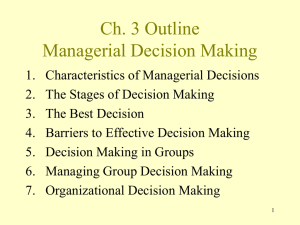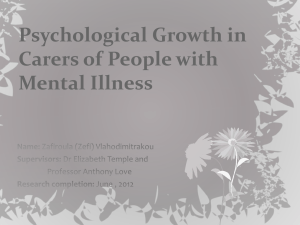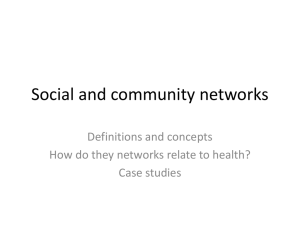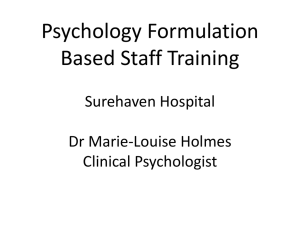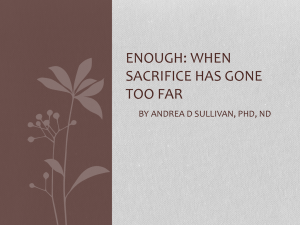Psychological Care What is important and whose responsibility is it?
advertisement
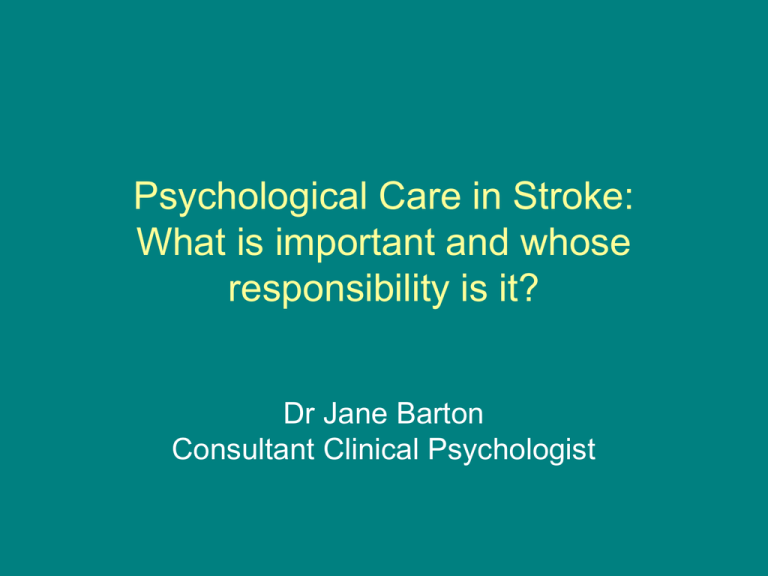
Psychological Care in Stroke: What is important and whose responsibility is it? Dr Jane Barton Consultant Clinical Psychologist Overview • What is psychological care? • What is the scale of the problem? • Why are we focussing on this now? • The context & current drivers • What can we do about it? Emotional experience of stroke “We’re not just legs and arms and a mouth…we are human beings with a mixture of emotions. All these feelings…self esteem, self worth, confidence, identity …they’re all under attack after a stroke…you can feel vulnerable, frightened and you can lose yourself. Psychological support puts you back together again especially psychological support from someone who’s been down that road before. The timing can’t be predicted…sometimes it’s when you come out into your real world after hospital or it may be two - or more – years later when you discover that you will not make a ‘full’ recovery…it’s about reinvention and finding direction” Harry Clarke , Counsellor at Connect who has aphasia (Taken from Psychological Care after Stroke, NHS Improvement, 2011) Psychological care in physical health settings – what is it? • Essentially about integrating a psychological content within the overall physical care. • It is not something that stands alone and is separate from physical care. • Should be organised, systematic and practical. • Everybody’s business! Psychological Care (Nichols 2003) • Level 1 • Awareness of psychological issues • Patient centred listening & communication • Awareness of patient’s psychological state • Level 2 • Monitoring psychological state; keeping records • Information & education • Counselling & support • Level 3 • Psychological therapy & interventions What is the scale of the problem? Psychological & mental health consequences of stroke Scale of the problem 1 • Cognitive impairment Problems with memory, concentration, planning, sequencing, decision making, insight • Approx 75% experience cognitive impairment • Approx 35% have significant impairment long term • Significant proportion go on to develop dementia Scale of the problem 2 • Depression • Most common psychological presentation • Approx 25-50% • Independent of disability • Fluctuating course Scale of the problem 3 • Anxiety • Between 30-49% up to 12 years post stroke • Phobias, generalised anxiety, panic • Trauma response - PTSD • 20% show trauma response • Flashbacks, avoidance, hyperarousal The Impact • Untreated psychological mood disorders are associated with higher rates of : • • • • • Mortality Suicide Long term disability & institutionalisation Hospital readmission Higher utilisation of outpatient services Mental Illness Associated with Stroke • Depressive disorders increase risk of cardiovascular disease by 1.5x the general population, equivalent to risk from smoking or diabetes • People with severe mental illness have a 2.5x greater mortality from stroke • Those receiving highest doses of antipsychotic medication are at greatest risk of death from both CHD and stroke • Psychological stress associated with an 11% increased risk of stroke Why are we focussing on this now? Recent audits National drivers Audits & Reviews National reviews of stroke services demonstrate the need for improvement • CQC in 2011 found psychological support for patients and carers was less than readily available • NAO reported that psychological support for patients and carers was lacking Policy & Guidance • National Stroke Strategy (2007) • RCP Guidelines for stroke (2004; 2008) • And… “No health without mental health” (DH, 2011) “There is a clear link between mental and physical health and an urgent need to strengthen the provision of mental health care to people with physical illness and the quality of physical health care to people with mental health problems in general hospitals and in primary care” What can we do about it? • NAO report led to NHS commitment to improve 9 domains through Accelerating Stroke Improvement • Psychological support – ASI 6 • Targets set • Guidance on developing services Psychological Care After Stroke (NHS Improvement, 2011) • Guidance on developing services • Addressing psychological need after stroke should be accepted as an essential part of the culture of stroke services and equivalent to the management of physical need. • Stepped care model Stepped Care approach to psychological care • A hierarchical approach. • Offers simpler interventions first, progressing onto more complex interventions if required. • Not necessarily a linear process. • Makes best use of skills of MDT & utilises more specialist staff for more complex problems. Stepped Care Model for psychological interventions after stroke (NHS Improvement 2011) • Level 3: Severe and persistent disorders of mood and/or cognition – requiring specialist intervention from clinical psychology / Mental Health • Level 2: Mild/moderate symptoms of impaired mood and / or cognition that interfere with rehab – requiring specialist stroke staff with psychol / MH expertise. • Level 1: Sub-threshold problems – requiring awareness and screening by stroke specialist staff Level 1 Screening & sub threshold problems • Task • By whom? • Awareness of psychological issues & patient’s psychological state • The whole of the MDT – everyone! • Providing low level psychological care: e.g. patient centred listening & communication • Alerting others & signposting on • Ensuring discussion & review at MDT • Mood and Cognitive screening • Sub group with training Psychological Screening Formal, standardised measures (RCP, 2008) • Mood & distress PHQ-9; GAD-7 DISCS – aphasia SADQ – severe aphasia / cognition • Cognition ACE-R MOCA Level 2 Mild – Moderate problems • Task • By whom? • Further assessment & monitoring • Brief psychological interventions (including psychotherapeutic groups) • Onward referral & signposting – to clinical psychology • MDT staff with additional competence in psychological / mental health Level 3 Severe or persistent mood / cognitive problems • Task • By Whom? • Specialist assessment with complex mood & cognitive presentations • Clinical Psychologists…….with training in neuropsychology • Suicide risk assessment and management • Psychological interventions & therapy • Liaison & onward referral to specialist MH services • Specialist mental health practitioners Summary • Understand the importance of physical and mental health • Raise awareness within the services • Know your role and level of expertise • This is everybody’s business!!

